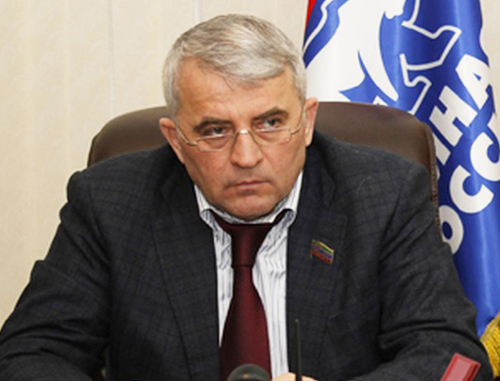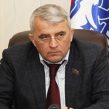
Another Political Murder Committed in Dagestan
Publication: Eurasia Daily Monitor Volume: 11 Issue: 77
By:

On the morning of April 17, Dagestani parliamentary deputy Musa Islavov was killed on Babayurt Road in the city of Khasavyurt by unidentified assailants who fired at his car before fleeing the crime scene. The deputy was killed on the spot while his driver, 45-year-old Ruslan Alisultanov, died later in the hospital (https://lifenews.ru/news/131435).
Musa Abdulmalikovich Islavov was a deputy in the People’s Council of the Republic of Dagestan from the United Russia party who had been elected to the republican parliament three times since 2007. In the parliament, Islavov held the position of deputy chairman of the Committee for Budget, Finance and Taxes. However, membership in Russia’s ruling party did not prevent him from taking part in a recent protest by Chechens in Dagestan’s Khasavyurt district, who blocked the highway that connects the city of Khasavyurt and Novolak district, demanding the return of territory in Novolak district that belonged to the Chechens prior to their deportation in 1944 (https://www.kavkaz-uzel.ru/articles/241127/).
Islavov was an ethnic Chechen who has the same view of the land dispute as the other 100,000 or so Chechens who live in Dagestan. However, such a position may have been seen as unwelcome by one of the most influential political figures in Dagestan—Khasavyurt district head Saigidpasha Umakhanov, who is an ethnic Avar and someone who does not tolerate any opposition to his rule in the district (https://kavpolit.com/articles/deputata_mogli_ubit_vymogateli-3340/).
Yet, by killing Islavov, Umakhanov would have been embarking on a collision course with his friend, Chechen president Ramzan Kadyrov, and thus it is unlikely the Khasavyurt district head was behind the murder. The official spokesperson of Dagestan’s Investigative Committee, Rasul Temirbekov, stated after the murder: “The primary version is that illegal armed groups killed the member of parliament because he was strongly opposed to the militants. Musa Islavov was targeted before in 2013, when he received a leg wound” (https://www.regnum.ru/news/kavkaz/dagestan/1792754.html).
However, the 2013 attack on Islavov was evidently not connected to his political activities. It took place on April 2, 2013, when two unidentified masked individuals approached him as he was getting into his car in Khasavyurt and demanded he hand over his money. When Islavov refused to comply, the attackers shot him, wounding him in the thigh and arm. The parliamentary deputy was hospitalized. That attack was purely criminal and had nothing to do with the insurgents.
Investigators have concluded that Islavov’s killing was punishment for his refusal to make extortion payments to the insurgents. The deputy was known in the city as a successful businessman involved in wholesale and retail trade in building materials (https://www.kommersant.ru/doc/2454381). Even though this version may be plausible, the insurgents could have benefited much more had they used Islavov not only as a source of money, but also as a shield. For example, the former emir of the Aukhov jamaat, Ruslan Muskhajiev, who was killed in the summer of 2013, lived close to the deputy’s house in Khasavyurt. The theory that the rebels were involved in Islavov’s murder is highly beneficial to many people since it could screen the real organizers of the crime from the investigators. Blaming the militants for the crime is also quite useful to the investigators.
However, the killing also may have been the result of Islavov’s activities as deputy chairman of the Dagestani parliament’s Committee for Budget, Finance and Taxes, which may have touched corruption schemes in the republic (https://www.moscow-post.com/politics/kriminal_nanes_udar_po_bjudzhetu_dagestana14109/). This is particularly likely given that the clan-mafia system of power in the republic has survived untouched despite the reassurances of the current Dagestani leader, Ramazan Abdulatipov (https://gazeta-nv.info/content/view/57651/216/).
Still, it is worth noting something said in Islavov’s official obituary, which was signed by the republic’s leaders and parliamentary deputies: “As a deputy from the multi-ethnic city of Khasavyurt, Musa Islavov paid much attention to confronting the ideology of religious extremism and rejecting any form of nationalism” (https://rgvktv.ru/news/24562).
This may be the link tying the killing to the rebels. If Islavov crossed a certain red line in his perfunctory condemnations of religious extremism, the militants may have decided to kill him in response. It is an open secret in Dagestan that all of the republic’s politicians are obliged to echo the criticisms of the Kremlin’s appointee in the region, Ramazan Abdulatipov. Islavov may have engaged in the same activities, trying not to be left behind by his colleagues in the United Russia party.
In their attempt to attain the same outcomes as in neighboring Chechnya, Dagestan’s leadership sometimes awkwardly replicates the Chechen authorities’ tactics. However, the situations in Chechnya and Dagestan are quite different in terms of the level of rebel activities, threats from the militants, the authorities’ ability to suppress the rebel forces, and so on.
The Dagestani authorities’ actions against Salafist groups are glaringly ineffective, as shown by the recent crackdown on the parishioners of a Salafist mosque in the town of Shamkhal, a Makhachkala suburb. The police apparently planned to arrest several hundred Muslims after Friday prayers there on April 18. However, the mosque’s parishioners saw the large number of police officers and vehicles and did not go to the mosque, instead attending Friday prayers at different mosques in small groups. This came as a surprise to the police, who ended up detaining only several persons (https://dagestan.kavkaz-uzel.ru/articles/241202/).
Such unproductive and unhelpful actions by the authorities are unlikely to prevent new crimes against the politicians and religious leaders in Dagestan. The government repeatedly fails to investigate the murders of politicians and religious, thus showing its weakness. This situation will further strengthen the position of radical Islamists in Dagestan. The republic is evidently facing tumultuous times in the next few years.




